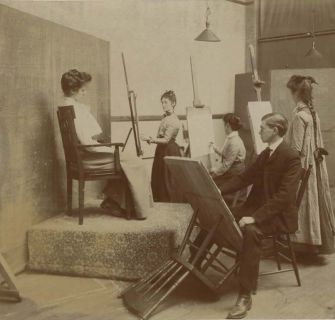After a concert I played in Munich in May, there was a question-and-answer session. (I performed music written by Alvin Curran, Sylvano Bussotti, and Earle Brown.) One audience member asked if a performer of newish music still needs to study Chopin’s etudes?
Since the pervasive use of photography by visual artists, the question arises in art schools: “Do art students need to learn how to draw?”

To the question in Munich, my immediate answer was that pianists in music schools still do study Chopin’s etudes, and Liszt’s, and Beethoven’s sonatas. Whether this is essential to master the instrument, I doubt. It does influence (or skew) a basic sense of what music is. And, that resultant understanding of “music” is inclined to line, goal (teleology), and development.
It used to be that almost every player of the viola started out by learning the violin. For a few decades, this has been changing. Now, there are excellent violists who start their musical lives directly with the viola. Do they sound different?
What kind of music-making would ensue if the repertory pianists studied began with Stockhausen?

Thought-provoking concept that what one studies influences one’s view of music. In terms of developing technique, one should identify and practice those etudes/studies which help to develop facility, strength and technique in areas where one is weak. This is at least true for the physical, athletic aspect of playing. As for the aesthetic, expressive side of playing, I would advocate experiencing as many different things as possible and not limit the choices. Music is a great continuum of shared experience.
All that being said, I personally haven’t much use for Chopin–his stuff makes my hands hurt, and I seem to desire a different take on expression than what I find in his pieces.
Excellent post. I do not know how the music performance might change if one’s initial canon were, say, Stockhausen and Part rather than
Chopin and Mozart. Yet I imagine that the resulting generation would include more pianists who saw themselves as composers first, and performers second.
Great post, Dr. B. Here’s my response.
http://tinyurl.com/kn9b68
Kathryn Bacasmot